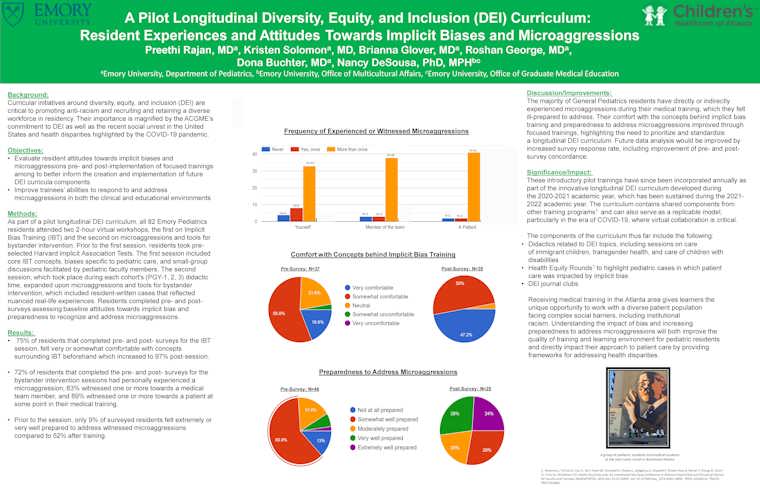As part of a larger school-wide effort to socialize the entire Emory University School of Medicine community to education on major themes of diversity, equity, and inclusion (DEI), Dr. Nancy DeSousa and colleagues developed a longitudinal DEI curriculum for pediatrics residents to understand the residents’ experience of microaggressions as part of ongoing efforts to improve the sense of inclusion within the Pediatrics Department. They presented their work in the Poster Hall at the 2022 ACGME Annual Educational Conference, held virtually March 30-April 1, 2022.
Poster: A Pilot Longitudinal Diversity, Equity, and Inclusion (DEI) Curriculum: Resident Experiences and Attitudes Towards Implicit Biases and Microaggressions
Authors: Preethi Rajan, MD; Kristen Solomon, MD; Brianna Glover, MD; Roshan George, MD; Dona Buchter, MD; Nancy DeSousa, PhD, MPH
ACGME: Can you tell us about your academic and professional role?
Dr. DeSousa: I am Assistant Director of the Office of Multicultural Affairs, Learner Diversity Programs for GME at Emory University School of Medicine. In this role, I assist GME programs with development and implementation of DEI curricula; recruitment and retention of URiM trainees; and supporting the academic, social, and professional development needs for all trainees, particularly as it relates to issues of equity and inclusion. [Co-authors] Drs. Preethi Rajan and Kristen Solomon are both PGY-3 residents in the Department of Pediatrics and serve as co-chairs for the residency arm of the DEI Committee for the department.
ACGME: Can you briefly describe your project for us?
DeSousa: The project was providing foundational workshops on implicit bias to the entire complement of pediatrics residents and then subsequent class-based sessions, which included resident-written case studies on bystander-to-upstander responses to microaggressions. We engaged in pre- and post-test surveys to not only ascertain residents’ perspectives on the importance of DEI education, but also their experience of microaggressions and comfort level in addressing microaggressions in clinical and educational environments. These sessions conducted in the beginning of the academic year set the stage for incorporating DEI into longitudinal curricula, which include more topical DEI didactic sessions on sub-populations and diseases, Health Equity Rounds, and DEI journal clubs.
ACGME: What inspired you to do this project?
DeSousa: This project coincided with DEI leadership developing a school-wide strategic plan for Diversity, Equity, and Inclusion which included exposing the entire EUSOM community to education on Implicit Bias, Bystander to Upstander Response to Microaggressions, History, and Anti-Racism. I partnered with Department of Pediatrics residency program and DEI leadership who were also interested in developing longitudinal DEI curricula for the residents. Drs. Rajan, Solomon, and Glover provided guidance on how to best structure these initial sessions and designed the case studies based on their lived experiences and accounts from fellow residents of common microaggressions in the clinical and educational environment. Dr. George, as part of the departmental DEI committee, added the evaluative component to take this opportunity to understand the residents’ views on both the utility of the sessions and their experience of microaggressions in the space. These efforts were supported by the then-program director Dr. Buchter in alignment with the department’s strong commitment to both improving the sense of inclusion within the department and developing culturally responsive pediatricians.
ACGME: What did you discover?
DeSousa: There was already an existing comfort with concepts of implicit bias (75%) but this increased to nearly 100% post-session. The majority (72%) of the residents have experienced a microaggression, and even more have witnessed microaggressions against a colleague (83%) or a patient (89%). Prior to the bystander session, only 9% of those surveyed felt extremely or very well prepared to address microaggressions, which increased to 52% post-training, with no one responding “not at all prepared.”
ACGME: What was the main takeaway?
DeSousa: There is an obvious need for these types of trainings as residents at all levels of training have directly or indirectly experienced microaggressions. Based on evaluations and verbal feedback, the sessions were well-received and the residents’ comfort level in addressing these issues improved substantially post-training, highlighting the importance of addressing these concepts as foundational for future DEI programming.
ACGME: Who could benefit from this?
DeSousa: Other program directors and DEI professionals and educational leaders in the GME space should consider use of foundational sessions such as these in addition to evaluation of not only the sessions but also the climate and culture change over time, e.g., how comfort level and experience of microaggressions changes throughout the course of a resident’s program. This could serve as a model for other programs in implementation of a similar curriculum and evaluation process, particularly through a virtual format.
ACGME: Any additional follow-up plans?
DeSousa: As stated, we hope to continue to implement the foundational training sessions for future cohorts and expand the sessions to incorporate more discussion and updated cases for those who have seen the content in previous years (e.g., the second- and third-year residents). Using this department as a model, I plan on instituting similar educational programming in other GME programs that are both specialty- and training-level specific. The Pediatrics Department plans on continuing to incorporate the additional curricular elements mentioned previously and institute and compare climate data over time to see if longitudinally the educational sessions have an impact on quality of patient care and culture and climate related to experience of microaggressions.

